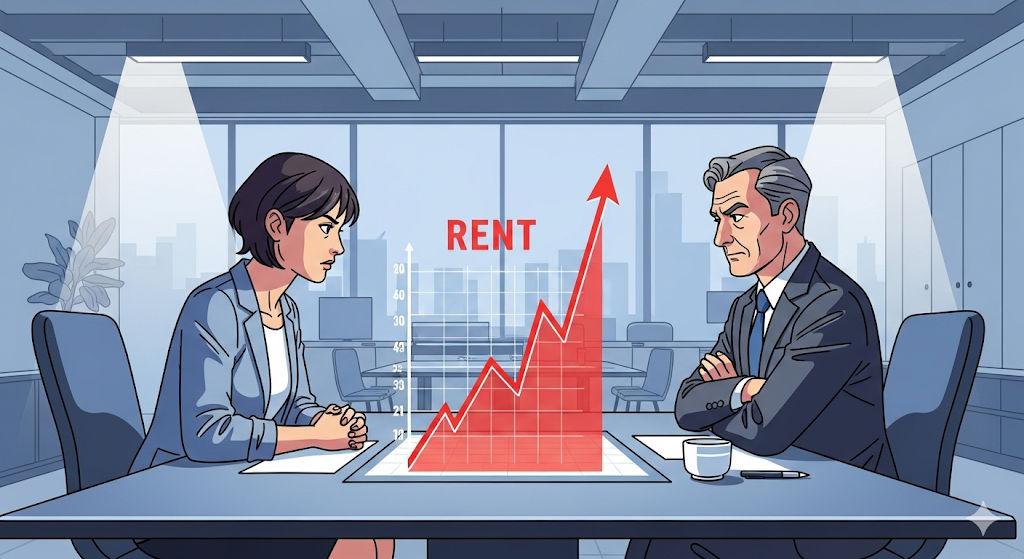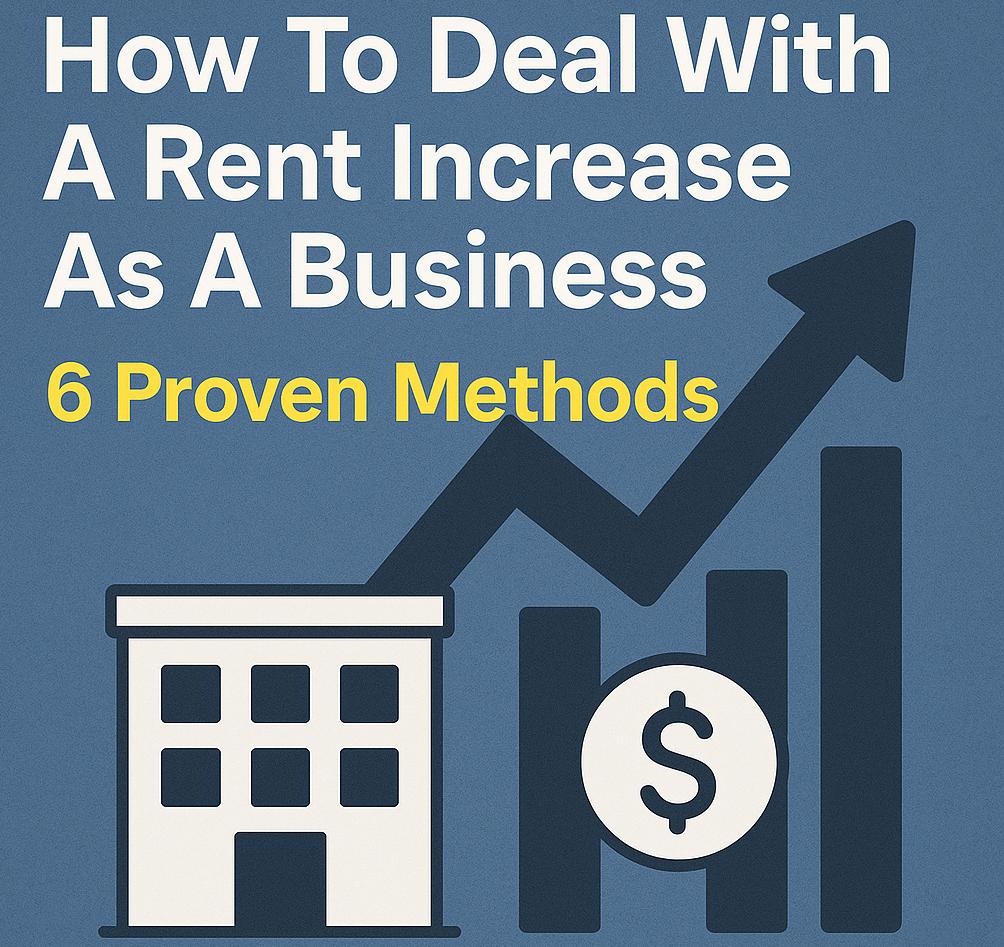How To Deal With A Rent Increase As A Business: 6 Proven Methods
If you’re a small or medium-sized business, or even a large one, you may have felt the force of a landlord at some point. Things may have worked out well, the working relationship smooth, until one day they hit your business with a rent increase.
In some cases, an increase in commercial rent can tip a company over the edge. In other cases, it could increase financial pressure that already may have been high. It will certainly always curtail growth.
If this situation sounds familiar, then you may be here looking for ways to deal with a rent increase as a business. If so, you’ll find useful answers and guidance here.
Below, we explain six effective methods for dealing with increases in commercial rent—proven methods which other companies have used successfully. We also look at the legality of rent increases and what you can do to plan for the future.
Let’s dive in.
How Do Rent Increases Work?
In the US, commercial rent increases aren’t uncommon. In many cases, the lease that you sign with your landlord will contain a clause that allows the landlord to review the rent. There may be some key terms surrounding this, such as:
-
- The date upon which they can review the rent. For example, this could be once a year, or you could agree on a longer period of time where the rent cannot be adjusted.
- The level at which rent can be increased. Some contracts may have limits on the amount by which rent can increase. Others may leave this open-ended, which could lead to nasty surprises down the line.
- Whether the rent increase can be negotiated or appealed. Some contracts, depending on who they’re with, may offer you a chance to appeal a decision.
- Whether other costs are included on top of the rent, such as taxes and utility rates
Not all lease agreements are the same, so it’s important to check over yours carefully. If you’re unsure about anything, ask for clarification, or seek legal advice—something we explain in more detail below.
Is My Landlord Allowed To Increase My Commercial Rent?
Yes, a landlord is allowed to increase commercial rent, depending on the terms of the lease agreement you sign.
For example, there should be a clause or term in the contract that permits them to review the rent. This should state when they can do so, and by how much they can increase it.
If the contract doesn’t say anything about a rent increase and your landlord is threatening your business with a rise, then you could challenge this.

What Impact Can A Rent Increase Have On A Business?
If you run a small business, you may appreciate the fineness of your profit margins. Even a slight increase can see profits dwindle and debts begin to mount.
Rent is often tied to location, too, and companies can find themselves caught in a bind between the need for footfall, like in the case of retail and hospitality firms, and the ability to pay a reasonable sum.
What many landlords don’t appreciate is that rising commercial rents can have significant knock-on effects. Some of the most common include:
-
- The company may need to increase its prices to deal with the added cost. This may then make them less competitive in the market in which they operate, seeing them lose customers
- A company may have to make brutal cuts to keep within its budget. Losing members of staff may decrease the level of service provided, and this can lead to customer dissatisfaction
- A business may be driven deeper into debt by taking out loans to cover the extra cost
- In the worst-case scenario, a company may have to close its doors or move location to somewhere more affordable, which may hit its pockets hard.
Rent increases are never welcome, and sometimes, a sharp rise can change the future of a company overnight. Let’s look at ways businesses can deal with a rent rise.
How To Deal With A Rent Increase
As we’ve explored above, a rent increase can leave a business in a very difficult position. It’s a bitter pill that doesn’t always have to be swallowed, however. Let’s take a look at some effective ways to deal with a rent increase as a business.
1. Re-Negotiate or Appeal The Decision
If you’ve been hit with a rent rise, one of your first ports of call is to review your lease agreement. Contained within it may be a clause that gives you the right to challenge the decision, or an opportunity to negotiate.
If the contract doesn’t say anything to this effect, it doesn’t mean you can’t try. A right to appeal may not be granted to you, but you could still approach your landlord and ask them to compromise.
Let’s look at some tips on what to do when you speak with your landlord as a tenant.
How To Negotiate With A Landlord
It’s natural to feel a little intimidated when dealing with your landlord. Afterall, they could kick you out. But in many cases, a landlord is delighted to have respectful tenants who always pay the rent, so if you have a good track record, they won’t want to lose you.
Keep this in mind when you approach your landlord to negotiate your rent rise. Explain to them that you’ve never missed a payment, you’ve maintained your space well, and added value to their property and the wider area.
You can explain to them the issues the rise would pose to your business and what the likely options you have would be.
In some cases, you may be able to negotiate a smaller rise, or perhaps even defer the rise to another financial year, if not get it scrapped altogether.
2. Threaten To Vacate
Related to the first point, if your landlord is refusing to consider your position, you can offer them the nuclear option—vacating altogether.
There is a risk involved, especially if you do not want to leave your current place of business. But it can be a way of showing the other party that you’re serious.
As mentioned above, a landlord does not want to lose a consistently reliable tenant, especially if they’re already struggling to sell rental space as it is. If, for instance, your business is in an office block, you can check to see how many empty offices there are. If there’s a high number, you can use this to your advantage, threatening the landlord to make their difficult situation even worse.
It’s a powerful negotiating tactic, but just remember the risks involved.

3. Review Your Profit Margins and Adjust
If there’s nothing to be done with the landlord to tackle the problem of a commercial rent increase, the next step is to see what impact it has and adjust.
A good starting point is to review your current profit margins and factor in the new cost increase. For example, your margin may have been at 18%, and with the new increase, it’s dropped to just 8%.
If you find yourself in a situation like this, you could look to review prices of some products and services to push the margin back up to where you want it to be.
4. Consider Increases When Planning and Budgeting
As a business owner, it’s important to plan ahead and prepare for any sudden changes, like a rise in costs. When reviewing a lease for the first time, make a note of any renewal dates and terms relating to rent increases. If you work with an accountant, inform them of this too.
When it comes to projecting your profit and loss accounts and cash flow forecasts, you can work with these predicted rises. This way, you can prepare in advance and take steps to mitigate the added cost.
If you’ve just been hit with a rent rise, then this option isn’t ideal, but it’s something you can build into your strategy moving forward.
5. Review Other Costs and Make Cuts
Related to reviewing profit margins is undertaking a review of all of your current expenditures. If you’ve benefited from a reasonable rent, you may have forgone slightly higher costs in other areas of the business. By analzying your current spend, you may find that you can find cheaper suppliers, for example, and save money there. This way, you can maintain a healthy profit margin.
Undertaking a regular expenditure review will also help you identify any areas where you’re spending a lot and not gaining much. Sometimes, this occurs with staffing, where certain individuals on high wages are underperforming or their role has become less critical. Cutting costs in areas like this can help you save money to deal with higher costs elsewhere.
6. Get Legal Advice
If you’re feeling aggrieved at the increase in your business rent and feel your landlord is wrong, you can get legal advice on your position.
Under commercial and contract law, landlords and businesses must follow strict rules. If a contract breaches these rules, then you may have a solid way to challenge the rent increase.
The downside to this route is that it may require some level of cost to pay for a lawyer or attorney to handle the work on your behalf, and it could sour relations with your landlord. On the other hand, it can also prove decisive in bringing the dispute to a close.
|
Method No. |
Effective Method |
Key Action Points |
Contractual Basis |
|
1 |
Re-Negotiate or Appeal |
Review your lease for an appeal clause. Approach the landlord, highlighting your track record (never missed a payment, maintained space). |
Check the lease agreement for a specific clause granting the right to appeal or negotiate. |
|
2 |
Threaten To Vacate |
Use the risk of your departure as a negotiation tool, especially if the landlord has high vacancy rates. |
This is a high-risk negotiating tactic, not a contractual right. |
|
3 |
Review Profit Margins and Adjust |
Factor the new cost into your profit margins. Increase prices of products/services to push the margin back up. |
Internal business strategy; no direct contractual basis. |
|
4 |
Consider Increases When Planning and Budgeting |
Note renewal dates and rent review terms when the lease is first signed. Project future costs into P&L and cash flow forecasts. |
Uses key dates and terms found within the lease agreement for planning. |
|
5 |
Review Other Costs and Make Cuts |
Conduct a thorough expenditure review to find cheaper suppliers or cut underperforming/less critical roles. |
Internal business strategy; no direct contractual basis. |
|
6 |
Get Legal Advice |
Consult an attorney to see if the contract breaches commercial or contract law, providing a solid challenge. |
Relies on external legal principles and how they interact with the lease contract’s terms. |
Rent increases are always a pain to deal with especially in an economy that’s working through a period of high inflation but if you follow the above advice, you should be able to logically deal with the increase. You can find more business help and advice at https://businessrout.com.

